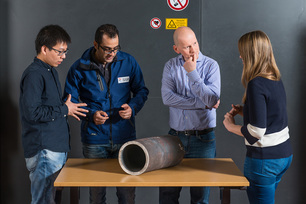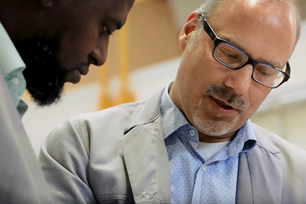"Diversity enriches our research and strengthens our innovative power."
Parsa Asna Ashari, Digitalization of the quality infrastructure
BAM is proud of its diverse, multicultural and international workforce. More than 1,500 people from over 50 countries and cultures work here. Research thrives on exchange. Our research is intercultural and interdisciplinary. We firmly believe that each and every one of us makes a valuable contribution. That's why we promote a spirit of belonging in which everyone feels welcome and valued from the outset.
How we promote an international work environment:
- "Welcome Office ": The Welcome Office supports international academics before and when they first arrive at BAM.
- Personal consultation: Both before entering the country and during their stay, international employees receive personal support from the Human Resources Department on issues such as salary, working hours, vacation, home office, sick leave, VBL, applying for residence permits and other issues.
- Assistance with applying for residence permits: Both academic employees and their spouses and children are supported in applying for residence permits (blue card/residence permit) at the State Office for Immigration (LEA).
- Language courses: BAM employees have the opportunity to attend language courses offered by the Federal Language Office.mit einem Welcome Office, dass beim Ankommen in Deutschland hilft
People@BAM: „Being curious helps accepting others“

Reza Darvishi Kamachali, Fachbereichsleiter Materialmodellierung, Lucia Casali, Materialwissenschaftlerin im Fachbereich Strukturanalytik und Ana de Oliveira Guilherme Buzanich, Physikern im Fachbereich Strukturanalytik
Source: BAM
How can prejudices and stereotypes be avoided in the workplace in order to create a diverse and inclusive workplace culture?
Reza Darvishi Kamachali:
Acknowledge the problem and talk about it openly: As with any other problem, the first step is to recognize the issue and talk about it openly. Whether it's in a friendly conversation during a lunch break or in department and division meetings: I think it's really valuable to engage with people about how important it is for our collective teamwork, productivity, wellbeing and social progress to be considerate of different people's backgrounds. Awareness is key, and when we share our values openly, others can feel safe to discuss them with us. Of course, this works best when leaders take the initiative.Wie können Vorurteile und Stereotypen im Arbeitsumfeld vermieden werden, um eine diverse und inklusive Arbeitskultur zu schaffen?
Going beyond neutrality and seeing diversity as a blessing: Here in Germany, we have the means and opportunities to welcome and integrate people from different backgrounds. Of course, making everyone feel safe and included is the bare minimum. It's a fact that diversity is a source of creativity and innovation. Advocating for 'diversity to be not only respected but also valued' is something that can influence us on a fundamental level. And it is indeed vital to the strength and expertise of our research, technology and economy in today's rapidly changing world.
To everyone out there: We are committed to welcoming people of all backgrounds, genders, sexual orientations and beliefs. If you believe in the power of diversity like we do, come to BAM! Together we will become (ever) better!
What can each and every one of us do to better appreciate and promote the diversity of people in the workplace?
Lucia Casali: Everyone has their dignity and value (and of course personal characteristics), regardless of (or as a result of) their cultural background. In the workplace, I believe it is important to treat each person with respect and care - and the best way to achieve this, in my opinion, is to recognize each person's contribution to the collective and collaborative work; regardless of where someone comes from, what the person believes in or what gender they are.
Ana de Oliveira Guilherme Buzanich: One of the things I appreciate most about working at BAM is the diverse and interdisciplinary environment with colleagues from different backgrounds, beliefs or countries of origin. One thing I think we can do to promote inclusion and avoid prejudice is to be genuinely curious about others and remember that our own standards are changeable. Curiosity can be sparked simply by starting conversations about the country, social, economic and educational backgrounds of the people we meet. When we know more about it, we can accept each other better. Apart from scientific topics, these are actually the most common topics of conversation I have with my colleagues. I'm glad to see that the curiosity is mutual. In science, we are privileged and can be a living example of inclusion and breaking down prejudices. This is simply because we all have a common denominator - science - while each and every one of us represents an individual nominator (1, 2, ... n): Inclusion = (1+2+⋯+n) ÷ Science






